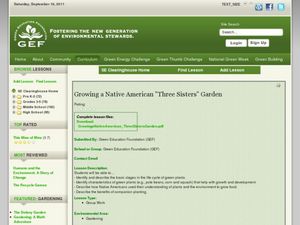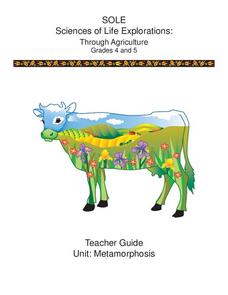EngageNY
Complex Numbers and Transformations
Your learners combine their knowledge of real and imaginary numbers and matrices in an activity containing thirty lessons, two assessments (mid-module and end module), and their corresponding rubrics. Centered on complex numbers and...
Columbus City Schools
Cell-abrate!
Lights, camera, action! With the cell at center stage, guide your seventh grade biologists through the tiny drama that plays out within every living thing. Then, enjoy the show as they portray the organelles they've studied—a performance...
Constitutional Rights Foundation
Naturalized Citizens and the Presidency
Article II, Section 1 of the U.S. Constitution takes center stage in a instructional activity that asks class members to assume the role of state senators, debate a resolution to amend the U. S. Constitution to permit naturalized...
Curated OER
Classifying Living Things
Students identify how to classify living things. They classify various concepts including family members, kinds of clothing, numbers, shapes, and vocabulary words. They discuss how to classify various concepts and classify pictures of...
Montana Office of Public Instruction
Native American Culture: Counting, 1:1 Correspondence
Kindergarteners practice showing 1:1 correspondence while incorporating information they learned about a local Native American culture. The objects used for counting are taken from the previous day's Native American instructional...
Curated OER
Growing a Native American "Three Sisters" Garden
Students explore plant life by creating their own gardens in class. In this food growing lesson, students discuss the types of gardening methods Native Americans used in order to keep healthy. Students plant corn seeds in their school...
Curated OER
Planning a Garden Using a Grid
Third graders plan for a garden. In this garden planning lesson, 3rd graders investigate the use of a grid to accurately map out and plan for a vegetable garden. Students predict the space requirements for different vegetables.
Cornell University
Metamorphosis
Looking for an insect unit that addresses multiple skill strategies? Young entomologists explore multiple life cycles of insects that go through metamorphosis. The brainteasers and mobile activity spark learner interest before guiding...
Curated OER
Economic Recovery? a Comparison of Indicators for Utah And the United States Since March 2001
Students discuss key business and consumer indicators that are used to measure the health of the economy. They compare the economic recovery (from the 2001 recession) of Utah and the United States. They discuss the benefits and...
Curated OER
The Gingerbread Man
In this unit students use the traditional tale of the gingerbread man as a context for ordering and comparing lengths. They compare the length of two objects directly, order three or more objects by length and select objects that are...
Curated OER
Analyzing The Research Of The Earth
Learners investigate the concept of technology. They are taught about various science applications and how the technology is used in the disciplines. Students pick a subject to research and then indicate the technologies related to it...
Curated OER
Zebra, Zebra Where Are Your Stripes?
Students observe the embryological development in the zebrafish. Developmental hierarchy from three germ layers is studied in depth. Research is validated on the body plan of the embryo.
Curated OER
Algebra II: Crickets-Nature's Thermometer
Students translate functional relationships into equations to answer questions. Students answer questions using different representations of the relationships: function rules, graphs of the function, tables of values, and equations and...














